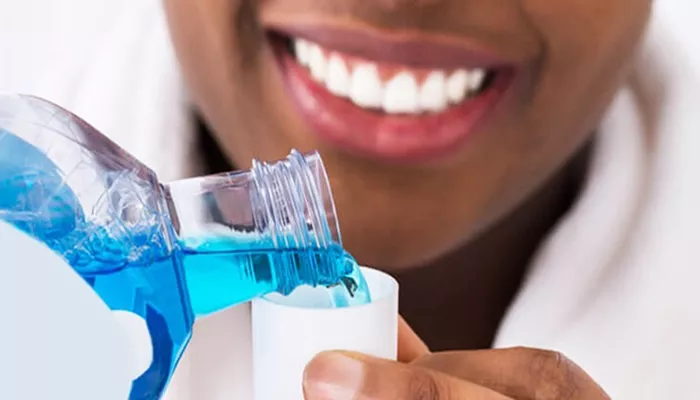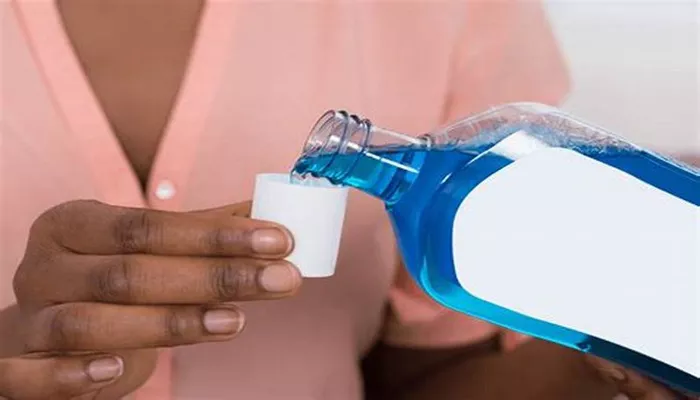antibacterial mouthwash ingredients
The effectiveness of antibacterial mouthwash largely depends on the active ingredients it contains. These ingredients are designed to target the bacteria that cause plaque buildup, gingivitis, bad breath, and other oral health issues. Common ingredients found in antibacterial mouthwash include:
1.Chlorhexidine Gluconate: Chlorhexidine is one of the most powerful antibacterial agents used in mouthwash. It works by disrupting the cell membranes of bacteria, preventing them from growing and multiplying. It is often used in prescription mouthwashes for the treatment of gum disease (gingivitis) and other oral infections.
2.Cetylpyridinium Chloride (CPC): Cetylpyridinium chloride is a quaternary ammonium compound with broad-spectrum antimicrobial properties. It is commonly found in over-the-counter antibacterial mouthwashes, helping to kill bacteria and reduce plaque formation.
3.Essential Oils: Some mouthwashes contain a blend of essential oils, such as eucalyptol, menthol, and thymol, which have natural antibacterial properties. These ingredients help fight bacteria and freshen the breath. Essential oils are typically included in alcohol-free mouthwashes, making them a gentler option for those with sensitive gums.
4.Hydrogen Peroxide: Hydrogen peroxide is an antiseptic that can help kill bacteria in the mouth and also lighten the appearance of stains on teeth. It is often used in mouthwashes designed to address both oral hygiene and cosmetic dental concerns.
5.Alcohol: Many traditional mouthwashes contain alcohol, which helps to kill bacteria and freshen breath. However, alcohol-based mouthwashes can sometimes cause irritation or dry mouth, particularly for individuals with sensitive gums or those who suffer from dry mouth.
6.Fluoride: While primarily known for its ability to prevent tooth decay, fluoride can also be found in some antibacterial mouthwashes. It strengthens tooth enamel and reduces the risk of cavities by remineralizing the teeth.
types of antiseptic mouthwash
There are several types of antiseptic mouthwashes available, each formulated for specific purposes. The choice of mouthwash depends on an individual’s oral health needs and preferences. Here are the most common types:
1.Therapeutic Mouthwash: Therapeutic mouthwashes are designed to provide more than just fresh breath. They are formulated with antimicrobial agents like chlorhexidine or CPC and are often recommended by dentists to treat gum disease, reduce plaque, and prevent gingivitis. Some therapeutic mouthwashes also contain fluoride to help prevent cavities.
2.Cosmetic Mouthwash: Cosmetic mouthwashes are primarily designed to temporarily mask bad breath, leaving the mouth feeling fresh. While they may contain antibacterial ingredients, their main purpose is not to kill bacteria but rather to improve the appearance of your breath. They are often alcohol-based and do not address underlying oral health issues.
3.Alcohol-Free Mouthwash: For individuals who are sensitive to alcohol, there are alcohol-free antibacterial mouthwashes that provide the same antibacterial benefits without the drying effect of alcohol. These mouthwashes are ideal for people with dry mouth, sensitive gums, or those who prefer not to use alcohol in their oral care routine.
4.Fluoride Mouthwash: Fluoride mouthwashes are specifically designed to strengthen tooth enamel and prevent cavities. They may also contain antibacterial agents to help fight plaque. Fluoride mouthwash is particularly beneficial for individuals who are at higher risk of developing cavities or those with sensitive teeth.
5.Natural Mouthwash: Some individuals prefer using natural or herbal mouthwashes made with ingredients like aloe vera, tea tree oil, or eucalyptus. These mouthwashes provide antibacterial benefits while being gentle on the mouth and free from synthetic chemicals. However, their effectiveness may vary compared to more conventional, clinically tested mouthwashes.
antibacterial mouthwash uses
Antibacterial mouthwash serves a variety of purposes in maintaining good oral hygiene and addressing specific dental concerns. Some of the most common uses include:
1.Preventing Plaque and Gingivitis: Antibacterial mouthwash is often used to prevent the buildup of plaque, which can lead to gum disease (gingivitis). By reducing the number of harmful bacteria in the mouth, mouthwash helps to prevent the onset of gingivitis, characterized by red, swollen, and bleeding gums.
2.Fighting Bad Breath: One of the most popular reasons people use antibacterial mouthwash is to freshen their breath. Mouthwashes with antibacterial ingredients kill the bacteria responsible for causing bad breath (halitosis), providing long-lasting freshness.
3.Post-Surgical Care: After dental procedures such as tooth extractions or gum surgery, antibacterial mouthwash can help prevent infection and promote healing. Dentists often recommend chlorhexidine-based mouthwashes following surgery to keep the mouth clean and free from harmful bacteria.
4.Treating Gum Disease: Mouthwashes containing chlorhexidine or other powerful antibacterial agents are often prescribed to patients with gum disease or periodontitis. These mouthwashes help to reduce inflammation, kill harmful bacteria, and promote overall gum health.
5.Reducing Cavities: Some antibacterial mouthwashes contain fluoride, which helps to remineralize tooth enamel and prevent cavities. This is especially helpful for individuals who are prone to tooth decay or who have orthodontic appliances that make it difficult to brush effectively.
6.Preventing Tooth Decay: Antibacterial mouthwash can also reduce the accumulation of plaque and bacteria on teeth, helping to lower the risk of cavities by maintaining a cleaner, healthier mouth.
antibacterial mouthwash brands
Several reputable brands offer antibacterial mouthwash with varying ingredients and formulations. Below are some popular options:
1.Listerine: Listerine is one of the most well-known and widely available mouthwash brands. They offer a variety of formulations, including antiseptic mouthwash with essential oils for antibacterial action, alcohol-free versions, and fluoride options for cavity protection.
2.Crest Pro-Health: Crest is another trusted brand in oral care. Their Pro-Health mouthwash range includes antibacterial mouthwashes designed to fight bacteria, reduce plaque, and prevent gum disease. Some versions also include fluoride for cavity protection.
3.Colgate Total: Colgate Total mouthwash is a popular choice for those looking to protect against bacteria and plaque. It offers options that target bad breath, gingivitis, and cavities, with formulations that include fluoride and antibacterial agents.
4.TheraBreath: Known for its focus on fresh breath, TheraBreath offers antibacterial mouthwash products that fight halitosis and improve overall oral health. They provide both alcohol-free and fluoride options, focusing on gentle yet effective bacterial control.
5.SmartMouth: SmartMouth offers mouthwash that targets both bad breath and plaque, with products designed to neutralize odor-causing compounds. Their mouthwashes are available in both alcohol-free and therapeutic formulas, providing long-lasting protection against oral bacteria.
6.ACT: ACT mouthwash is primarily known for its fluoride mouthwashes that help prevent cavities while fighting bacteria. The ACT range includes both antibacterial and fluoride mouthwashes designed for daily use and specific oral health concerns.
FAQs about Antibacterial Mouthwash
1.When to use mouthwash?
Some people use mouthwash as part of their daily teeth-cleaning routine. But you can also use mouthwash in a pinch to banish bad breath.
There’s really no hard and fast guideline for when to use mouthwash for bad breath. But it isn’t going to work to strengthen tooth enamel or fight gum disease unless you use it right after brushing and flossing.
For best results, teeth should be freshly cleaned before using use mouthwash.
2.How often should you use mouthwash?
It bears repeating that mouthwash isn’t a replacement for brushing and flossing. It’s also not necessary to use mouthwash in order to keep your mouth clean. Most mouthwash products recommend that you use them twice per day, after brushing and flossing.
3.Do dentures need mouthwash?
Yes, you should rinse your dentures and brush away food particles and debris twice daily. Use dental tablets that dissolve in water and soak dentures in the cleaning solution in a container. Always clean dentures over a soft towel or basin half full of water, as they can be slippery and easily break if they fall. Brush with a soft-bristle brush in lukewarm water. Thoroughly clean the denture. Rinse with mouthwash afterwards to keep the mouth feeling fresh and clean. When not in your mouth, dentures should be soaked in mouthwash.



